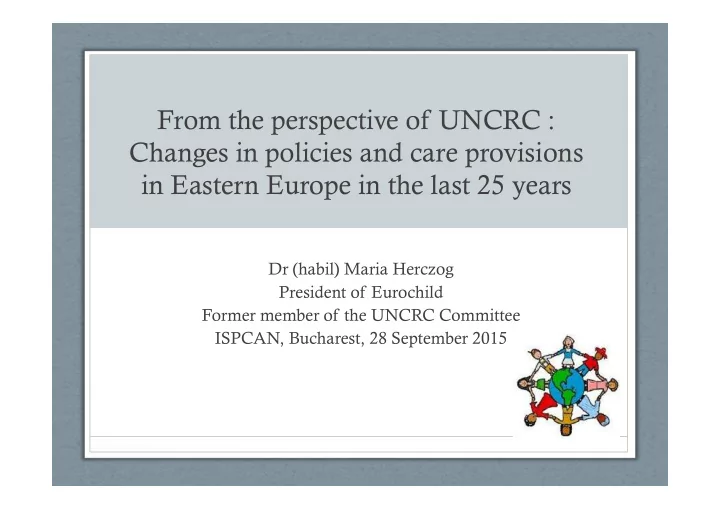

From the perspective of UNCRC : Changes in policies and care provisions in Eastern Europe in the last 25 years Dr (habil) Maria Herczog President of Eurochild Former member of the UNCRC Committee ISPCAN, Bucharest, 28 September 2015
Changing lenses • Child rights, human rights recognised, promise of freedom, choices, democracy - all transition countries ratified the UNCRC and OPs –should serve as a common ground and language – exercising rights has to be learnt by all! • Challenging and multifaceted changes of welfare and protection needs and responses – poverty, deprivation, segregation, discrimination, differences within the social groups are growing, distance between opportunities and access is widening • Social, economic transition and its impact during the last 25 years – expectations and realities
Similarities and differences • The forms and extent of political, economic and social reforms have been different as the countries themselves are different in the region • Cultural, social, economic, political background, tradtions readyness for change, modes of transition has differed widely – few co-operation with, learning from each other, • Health, education and social services, access, quality, at very different levels – from „free for all” to market economy but no satisfactory solution so far, • Almost exclusively state run provisions earlier, no or very limited NGO and private activities - difficult, controversial shift
Main issues in the region 25 years ago • Lack or preliminary social work education, very limited if any social services, authoritarian, paternalistic, hierarchical pedagogy, and health dominated approach, no partnership, “individual failure”, punitive approach • High number of children deprived of family care, mostly placed into institutions as a consequence, inter-country adoption in some of the countries • Unemployment, homelessness, severe poverty and deprivation has occurred and increased due to complex reasons • International aid, foreign NGOs, experts helping – no comprehensive vision, strategy, adaptation issues, controversial outcomes
Reforms and improvement • In all transition countries new legal frameworks, policies, modernised and newly established professional trainings, vocational programs and service provisions, efforts to meet the fast growing needs and new demands • Better data collection, research, international co- operation, technical assistance and program adaptation, evaluation and effectiveness measuring attempts • Decentralisation, more focus on preventive, local services, family strengthening, ECEC, gate keeping activities, integration and re-integration • Active participation on international programs, projects, organisations, research, trainings etc
Reforms and improvement Awareness about the needed changes, rights based approach, • prevention, early intervention, parenting support, family strengthening efforts Fast growing non-profit and some private provisions • De-institutionalisation efforts, development of prevention of out • of home care, kinship care, foster care provisions, domestic adoption, more awareness of abuse and neglect and its root causes, Awareness raising, empowerment of parents, children, civil society • organisations, increasing advocacy Alternative, new techniques – e.g. conflict resolution techniques, • (mediation, FGC, restorative practices), home Video Training,
Challenges and responses • Increasing poverty and impoverishment of many families, social deprivation, • Family crisis, isolation, • Substance abuse, mental health issues, • Child abuse and neglect, very high latency, still high institutionalisation rates • Exclusion and discrimination against the most vulnerable groups of children, e.g. minorities, first of all Roma, disabled children, refugees, migrant children – system abuse
Challenges and responses • Exploitation of children, children in severe social crisis, including war, hostilities, political unrest, • Migrant, refugee, left behind children • Helping professionals not properly trained, supervised and poorly paid, not valued highly in all sectors • Austerity, lack of political commitment, populist ideologies, fast growing inequality, changing, narrowing eligiblity, entitlement criteria – while growing demand, awareness - poor children, poor families, poor professionals, poor institutions, services, poor local authorities – poor outcomes
Challenges and responses The Western countries, “old democracies” facing very similar problems, extent and nature varies as well – the basic issues are the same, the responses, quality and level of service provision differ Roles and responsibilities of individuals, families, communities and the state, society not clearly defined and articulated - another system abuse factor Role and opportunities of the international organisations, bodies , like the UN treaty bodies, Council of Europe, European Union – conventions, guidance, protocols, framework – few binding rules, often poor implementation, lack of monitoring, follow up and accountability Investing in children, public spending and child rights, child budgeting, social return on investment needed for advocacy and improvement of policies and practices
Implementation of the UNCRC so far based on the guiding principles • Right to life and development • Right to non-discrimination • Right to protection from all forms of violence • Best interests of the child the main consideration in all matters • Child participation, right to be heard and listened to
The way forward • Child rights, human rights approach as a basis • Clear values, vision, strategy, policy, and budgeting, working together based on common values and language • Family and community based provisions, de-institutionalisation, local, universal, preventive and early intervention services, multisectoral co- operation • Empowerment of children, family members, participation and reliance on their own resources, while providing high quality, accessible and and affordable services for all, child friendly language and methods • Working together for all professionals, integrated training and supervision both at national and international level, more regional co-operation • Better monitoring, follow up, data collection and analyses, more research, evaluation, outcome measurement
Recommend
More recommend